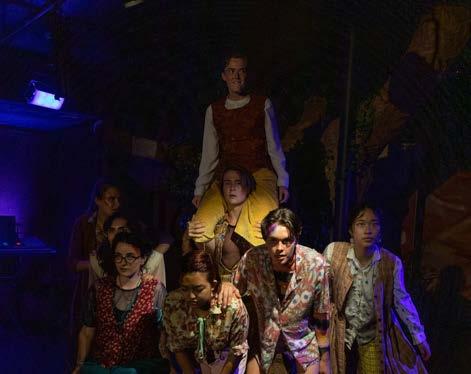
4 minute read
Margot Beavon-Collin
Review: SUDS Presents Orlando - Delightful Queercrip Fuckery
Margot Beavon-Collin apologises for the lateness of her review. She is very disabled.
Advertisement
In March, your reviewer was going as completely obvious. Or rather, not. through some shit. I was caught between We don’t know. Orlando’s changing coming to terms with a continuously relationship with gender over the course evolving relationship to my own gender, of the play is not a riddle to be solved. and increasingly forced to come to terms It is a process of self-discovery that with the impacts my disabilities were every trans person confronted with having on my day-to-day life. For me, the daunting precipice presented by SUDS’ production of Orlando, one of the process of coming out, leaping off, the last before the Cellar was closed as a only to realise that, maybe, gender is result of the pandemic, was a joy and a a bit more complicated than that, can revelation. recognise. Exploration of one’s gender Using Sarah Ruhl’s recent adaptation as a starting point, the cast and crew has been guided expertly by director Sean Landis to create a show so much more than its initial source material. is often difficult, not just at the initial point of outing yourself as trans, but long afterwards. There is an imperative for trans people to be absolutely certain about their identities at the moment of coming out, as a shield against the deluge of criticism
A cast of five in the original production levelled at us. “You’re confused.” Yeah, is expanded to eight, the text’s more and your virulent transphobia is not gender essentialist passages have been cut, helping, Joanne. SUDS’ Orlando presents or carefully rewritten, and the original this process of exploration avnd discovery staging’s sterile pomp and bombast, so in a manner that is delicate and bold in all typical of mainstage theatre, is replaced the right places. with colour, choreographed movement sequences, an amazing original score for string quartet and piano written by Sam Cheng and performed live, and an incredibly impressive centrepiece (a colossal tree constructed by the crew that extended up to the Cellar’s ceiling). The portrayal of the titular protagonist deserves special mention here. Robbie Wardaugh’s performance as Orlando was utterly magnificent. Throughout the entire play, they have the unenviable task of simultaneously portraying all of Orlando’s doubts, confusions, anxieties,
The most impressive part of the show, and gender transgressions, while however, is the urgency, passion, and love simultaneously being the audience’s main that every cast and crew member clearly point of continuity in a play that spans brought to its creation. It is one thing several countries and around 450 years. to do a once over of a text, sensitivity They not only succeed, they thrive. I was guide in hand, in an attempt to render mesmerised from beginning to end. a problematic show “unproblematic”. SUDS’ Orlando proves that the true strength of student theatre lies in the energy, immediacy, and unabashedly high stakes, politically minded, “we don’t give a fuck what mainstream audiences want, piss off, we’re making the show our community wants us to make” attitude that young people are so adept at bringing to everything they do. In a play so tied to self-discovery, a production that is so conscious of embodiment, and a review in the disability collective’s autonomous edition of Honi Soit, special mention should also be made of the casting of Robin Eames, a wheelchair user, in the production. If authentic representation of disabled people on stage is always a breath of fresh air (and it is), they were a tornado. It was
The question of Orlando’s gender, the so clear to everyone watching how at ease subject of so many tortured articles in they were on stage, gliding regally as the literary criticism, is consequently taken Queen in one moment, leading a raucous 18 carnival dance in the next. In a production for which movement and choreography was so integral, Eames never seemed out of place. The entire team clearly spent a lot of time, not thinking about how to awkwardly insert a wheelchair user into a production already fully-formed in their minds, but to collaboratively devise a show from which Eames’ performance was inextricable from the show itself. Disabled embodiment is truly beautiful, and makes for incredible viewing. It cannot be replicated by abled actors, no matter how committed to the method they may be.
The rest of the cast were wonderful. This show, absent any of its parts, could not have been as stunning a production as it was. The audience was variously brought to tears by Madeleine Gandhi’s scorned lover of Orlando, Isabelle Laxamana’s swaggering ship captain, Rachel Seeto’s very forward ArchDuchess (and later Arch-Duke), and Isla Mowbray’s gremlin-servant Grimsditch. Sam Martin made a very captivating Sasha, and Max Cattana’s Shelmerdine was delightful; simultaneously emotional, vacant, incredibly serious and headstrong.
SUDS’ Orlando was magnificent. I saw it three times during its run, and wish I had gone again. It represents everything that student theatre, and theatre in general, should aspire to be.









